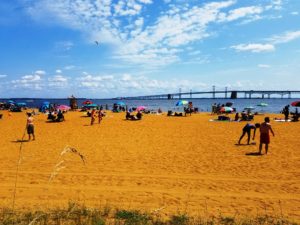Hood College’s Center for Coastal and Watershed Studies (CCWS), together with the Office of the Dean of the Chapel, has announced the initiation of a unique community gardening effort.
It’s unique because it aims to fulfill two grand purposes:
- mitigating excess storm water runoff to help restore the Chesapeake Bay watershed; and
- improving access to healthy produce for low-income families in Frederick, Maryland.
Although much of Frederick City is quite affluent, several areas have been identified as “food deserts,” or areas where residents are more than a half mile’s walking distance to the nearest grocery story, 20 percent or more are without access to a vehicle, and the median income is less than 185 percent of the federal poverty line.
The new program, “Growing for a Healthy Future,” plans to enlist the local interfaith community to establish and oversee community gardens in target areas to supply fresh, healthy foods to low-income residents of Frederick’s food deserts.
“When we discovered the extent of food deserts in our community … we realized that with our expertise, we are positioned to join in the efforts to eliminate them,” said Claire Hudson, who is managing this project from the CCSW. “Access to nutritious food needs to be at the forefront of our efforts, and we are excited to be working with local partners to collectively address this issue.”

Sandy Point Beach on Chesapeake Bay.
Photo credit: Storm Cunningham
The CCWS, in partnership with the Center for Watershed Protection—a nonprofit based in Ellicott City, Maryland—intends to design gardens that are fruitful and environmentally sustainable, using excess storm water runoff to irrigate the gardens. The entire area is within the watershed of Chesapeake Bay, so anything improving water management in Frederick helps restore the bay.
“In [our community], urban and suburban land use is growing at a rapid rate, and storm water runoff from rooftops, roads, and sidewalks is an increasing contributor to water quality problems in our local streams,” explains Drew Ferrier, director of the coastal studies program at Hood College. “If collected properly, there is a potential to divert some of that runoff from rooftops to supply water for raising vegetables or fruit trees.”
The staff of the CCWS and its new AmeriCorps VISTA member, Connie Ray, will be partnering with the Religious Coalition for Emergency Human Needs in Frederick to establish a pilot garden to be constructed this fall. In the coming months, they will gather community input to best tailor the program to area needs and enlist other faith groups and community partners to establish additional gardens.
Featured photo courtesy of Hood College.
See Hood College Center for Coastal and Watershed Studies website.

